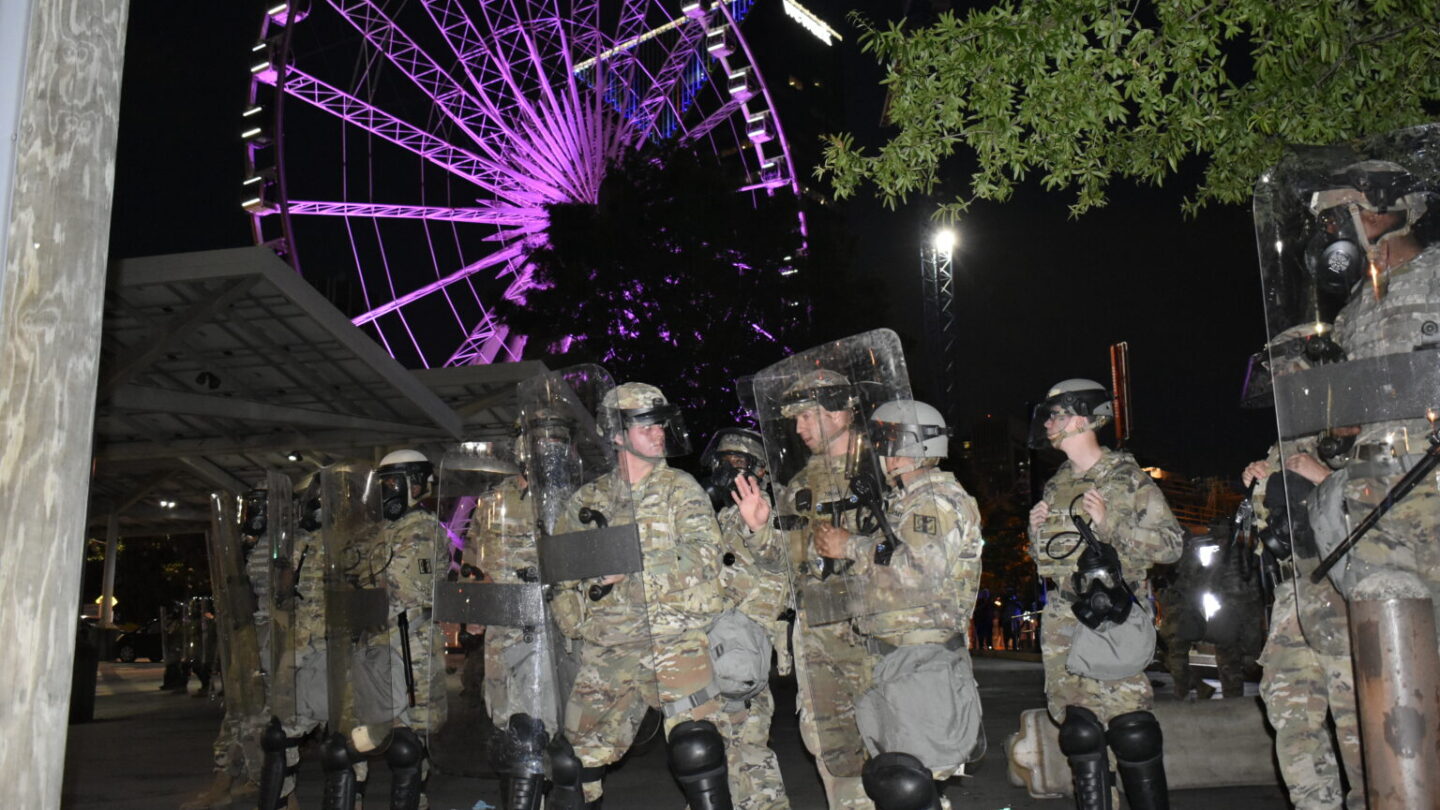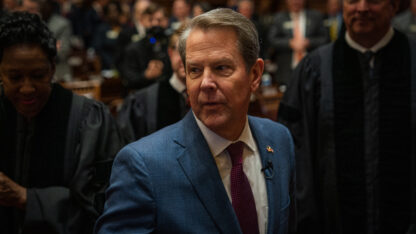Up to 1,000 Georgia National Guard troops could be coming to the Capital city in response to protests over an Atlanta police public safety training facility known as “Cop City.”
Gov. Brian Kemp signed an executive order declaring a state of emergency and authorizing the troops’ deployment Thursday. The order will last one week unless extended, and under it, the troops will be called to active duty “as necessary” by Adjutant General Thomas Carden.
Kemp’s order is a response to the unrest on Saturday, when “protests turned violent in downtown Atlanta as masked activists threw rocks, launched fireworks and burned a police vehicle in front of the Atlanta Police Foundation office building,” the document reads.
The move also comes as the Memphis Police Department plans to release video footage Friday showing a traffic stop for suspected reckless driving that led to the death of 29-year-old Tyre Nichols three days later. Five police officers involved were fired last week and indicted Thursday.
The troops will have the power to make arrests “to be exercised with caution and only if the circumstances demand the exercise of such powers to protect the safety of persons or property,” according to the order.
Tensions have long simmered over the planned training complex set to take over a forest near the city. Opponents, including some camping out in the forest, say the sprawling facility will destroy the local environment, and many also say they do not want increased police presence in the city.
Things came to a head Jan. 18 when a confrontation between officers and protesters led to the shooting death of 26-year-old activist Manuel Esteban Paez Teran and the wounding of a state trooper. Activists called Teran’s death a murder and rejected the police narrative that Teran shot first, questioning why none of the officers involved were wearing body cameras.
Downtown demonstrations following Teran’s death saw a police car set on fire, buildings damaged and windows broken. Six people who were arrested following the violence face charges of domestic terrorism, with Georgia Attorney General Chris Carr vowing to take the lead prosecuting them.
The project has also drawn more mainstream opposition, including from local homeowners, a group of Emory University doctors and the Georgia Chapter of the Sierra Club:
“Thousands of Atlantans and many local organizations, including the Sierra Club Georgia Chapter, came together over the last two years to voice their opposition to this project to Atlanta’s Mayor and City Council,” the chapter wrote in a statement. “They submitted public comments, sent emails to their representatives, organized marches and rallies, canvassed neighborhoods, and more.”
“Despite these efforts, the Mayor and City Council have continued to push this project forward, ignoring the will of community members and choosing to engage in violence by sending police to harass and arrest those protecting the forest.”
During his annual State of the State address Wednesday, Kemp condemned the violence and said he met with the injured officer, who is recovering in the hospital.
“Just this past weekend, when out-of-state rioters tried to bring violence to the streets of our capital city, State Patrol, sheriff’s deputies, and the Atlanta Police quickly brought peace and order,” he said. “That’s just the latest example of why here in Georgia, we’ll always back the blue.”
Shortly after the order calling out the troops, the Senate Public Safety Committee unanimously approved a bill titled the Georgia Fights Terrorism Act. Author Sen. John Albers, a Roswell Republican, said the bill allows the Georgia Bureau of Investigation to work in local jurisdictions without first making a request in cases of “domestic, cyber, biological, chemical and nuclear terrorism.”
An earlier form of the bill passed the Senate last year but did not get a House vote.
“Some of you might be thinking this must be a direct result of what happened over the last few weeks,” Albers said. “The answer is this was already going for a year. However, it certainly does impact what is happening right now.”
Albers said the right to protest is fundamental to America, but said those who would attack a law enforcement officer cross the line into domestic terrorism.
“You have the right to demonstrate, you have the right to have your opinion, you have the right to free speech. But if you break the law, you have the right to remain silent and be placed under arrest and we will throw the book at you,” he said.
GBI Executive Director John Melvin said the bill would allow investigators to more easily work across jurisdictions when dealing with potential terrorism.
“We’re not trying to preempt anybody, we want to work alongside all of our partners,” he said. “What this piece of legislation will do is say there’s something so particularly egregious that we’re okay with the GBI not just being an assist-only agency, but being a concurrent partner with our local enforcement agencies.”
The bill needs approval from both chambers and Kemp’s signature before it can become law.










